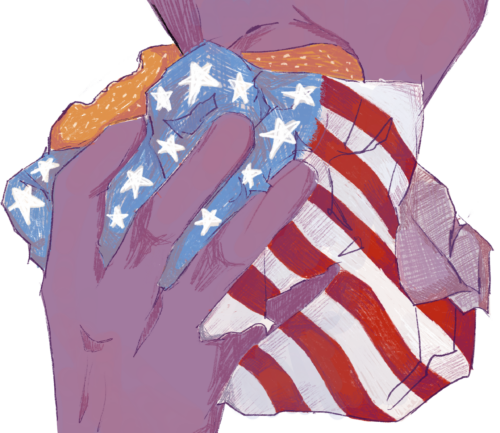America has the munchies.
From sea to shining sea, from Doritos Locos Tacos to Manifest Destiny, this country was built on a bottomless appetite—insatiable, indiscriminate, and utterly divorced from actual need. Expansion wasn’t just policy—it was craving. A sudden, stoned hunger for land, for oil, for more. Why stop at thirteen colonies when you could grab Texas, California, and a side of Guam?
The American Dream is a late-night fridge raid—chaotic, impulsive, directionless. Everything gets reheated at once. Nothing makes sense together. No plate.
And it’s not just our fridge. It’s not just our food. It’s everyone else’s, too.
America stumbles into the global kitchen like a high roommate on a rampage. It raids your pantry, eats your leftovers, spills your cereal, then gives you a lecture on democracy with a mouthful of Cheez-Its. It installs a microwave on your counter without asking, then hands you a pamphlet about free markets. It tells you it’s helping—bringing progress, liberation, and economic growth. Then it leaves a sticky note that says “you’re welcome,” written in oil and airstrikes.
That’s American foreign policy. We arrive uninvited, eat what we want, break what we don’t understand, and insist it was all for the greater good. Then we move on to the next kitchen. We call it “nation-building.” It’s just hunger dressed up in the language of imperialism.
Craving is core to the American mythos. It’s baked into the slogans: land of opportunity, pursuit of happiness, American Dream. But like any good edible, it always kicks in harder than expected.
The craving turns manic. It scales. The snack becomes a feast. The feast becomes a war.
We wanted freedom, so we forged an empire. We wanted wealth, so we built machines of extraction. We wanted safety, so we armed the world.
And every time the buzz wears off, we just reach for more—another country, another product, another identity crisis smothered in sugar and spectacle.
Consumption isn’t a side effect of American identity—it is the identity. Capitalism tells us we are what we buy. Patriotism tells us we are what we conquer. Together, they create a national high: euphoric, disoriented, a little numb, and quietly sad.
Maybe it’s the Protestant work ethic in our bones. Maybe it’s capitalism convincing us that rest is laziness and pleasure is weakness. Either way, joy has to be earned—or else apologized for.
Our snacks reflect our psyche: engineered, extreme, and impossible to ignore. We make chips taste like bacon cheeseburgers. We deep-fry ice cream. We’ve exported fast food more reliably than freedom.
‘Flamin’ Hot’ isn’t a flavor—it’s a foreign policy: overstimulating, underthought, and impossible to clean up after.
Even our candy is intense. Sour Patch Kids are psychological warfare in sugar form. American snacks don’t comfort. They escalate. They’re built for extremism—louder, hotter, more.
We’re a country that fears moderation like it fears communism. Subtlety is suspicious. Excess is patriotic. Bigger is always better—even when it’s bloated, wasteful, and slowly killing you.
It’s not enough to be full—you must overflow. The cupboard must be stocked. The tray must be piled high. And life must be optimized for maximum output.
Even rest is performative. You don’t just chill—you biohack. You don’t just take a break—you “invest in your wellness.” The American relationship to pleasure is paradoxical: You can indulge, but only if you confess afterward. Indulgence without guilt is un-American.
We eat the donut, then say we’ll “run it off.” We binge-watch, but call it a “guilty pleasure.” Even vacation must be justified—made educational, cultural, productive. Rest isn’t rest unless it’s earned. Pleasure must be balanced, neutralized, explained away. It’s not enough to enjoy something—you have to signal that you’re aware it’s too much. That you know better.
And in all this, we don’t even ask: Are we actually enjoying any of it?
Like the stoner who keeps eating long after the joy is gone, America keeps going—because stopping would mean reckoning. With ourselves. With history. With the fact that we’re full but never satisfied. We’ve binged the entire buffet of modernity and still think dessert will save us.
And when the existential nausea sets in, we do what we’ve always done: blame the wrong things. We say we need more, not less. More growth. More walls. More gas. More military. More noise.
The truth is, we’re terrified of hunger. Of stillness. Of not knowing what comes next. Hunger implies lack. Lack suggests vulnerability. And vulnerability feels too close to failure. So we create endless distractions, cravings, and expansion. We feed the void with plastic and policy, corn syrup and conquest.
But cravings are never just about food. They’re about feeling. About longing. About what’s missing. The U.S. doesn’t just crave land or oil or influence—it craves validation. Righteousness. The illusion of control.
That’s why American identity always comes with a side of moral superiority. Every war is a rescue mission. Every invasion, a favor. Every regime change, a gift. As if liberation can be air-dropped.
We raid the global fridge, take the last slice, then tell the world it was for its own good. Too greasy. Too chaotic. Democracy’s the cleaner option—gluten-free, American-made, and air-dropped.
This isn’t just history—it’s habit. National impulse. We consume because we can. Because we’ve been told it’s our right. And because somewhere, deep in the cultural gut, we fear the silence that follows when we stop chewing.
One day, maybe we’ll come down. Take a breath. Open the fridge and realize: we’ve devoured everything—except ourselves. Maybe then we’ll learn to sit with hunger instead of sprinting toward satisfaction. Maybe we’ll try moderation, humility, even curiosity.
Imagine an America that doesn’t release a new Mountain Dew flavor every three weeks. That doesn’t livestream rocket launches like Super Bowls. That doesn’t name military operations like video games. One where “enough” isn’t a punchline.
But until then, pass the Oreos. And also the $850 billion defense budget.
Luke Wagner ’26 (lukewagner@college.harvard.edu) is the Vice President of the Independent.

